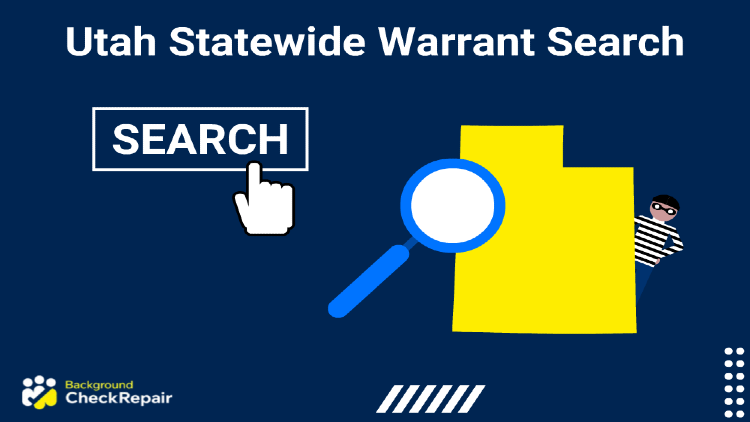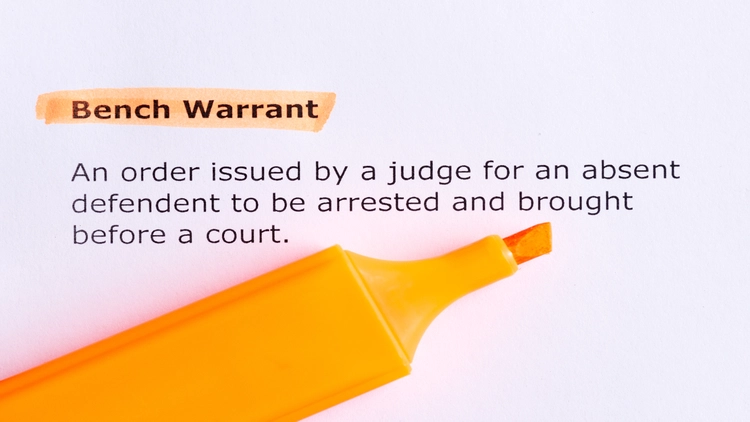How Long Does a Warrant Stay Active in Utah?
Law enforcement wants to bring the specific offender into custody to begin the intake and processing. The warrant will remain active in Utah until the individual appears in a court of law.
 Written by Background Check Repair
Written by Background Check Repair
Criminal Records | June 10, 2024

Table of Contents
Understanding the Utah statewide warrant search is an essential process for finding up-to-date Utah public records and looking up all outstanding and active warrants in the state.
The look-up process for warrant records, using the Bureau of Criminal Investigation (BCI) Utah warrant search process, county records, free statewide searches, and sex offender registry warrant records is a little trickier than many people realize. Since Utah is a closed records state, knowing the legal method to follow for searching warrants is crucial. But, by using these combined tools, they can provide all the resources needed to perform a Utah Statewide warrant search quickly, and accurately.
This complete guide explains and outlines all the steps to searching for (and finding) any warrant issued in the state of Utah, from the smallest county to a state-wide search.
An active warrant search is the process of looking for a warrant that is currently valid. If someone had an arrest warrant in the past, which may show up on a background check, this is not a current ‘active’ warrant, so the search process for old arrests and old warrants can be a little different.

But, an active warrant for someone’s arrest is valid at the present time, and it means that that person can be arrested, or have their property can be searched, depending on the type of warrant issued.
It will remain under ‘active’ status until the warrant is complete.
An active warrant search in Utah can provide individuals with information regarding outstanding warrants for a person’s arrest in Utah. Warrants can either be issued by smaller areas, such as local county jurisdictions, or the state. A warrant lookup search helps the individual identify current active arrest warrants, past warrants, and search warrants that have been issued for someone’s home or property. 1
To understand how to find arrest records and the process of a Utah statewide warrant search, there are a few legal aspects to consider during the search:
Utah is a “closed records’’ state, meaning it is more complex than other states to find information regarding arrest records and warrants (when compared to different locations, like the warrant search in California). 2
However, there are still a few possibilities for people searching for current warrants during a Utah statewide warrant search.

Individuals can use a free Utah warrant search instead of a nationwide warrant search to find the person in question and if they have any current or past warrants.
Step 1: Visit the Utah Department of Public Safety website.
Step 2: Click ‘Statewide Warrant Search’
Step 3: Enter the First Name, Last Name, and Middle Initial (if possible) of the person in question, and the captia checkbox.
Step 4: Click on ‘View’
Individuals can get a personal background check from the Bureau of Identification in Utah. To begin this search, individuals will have to do the following:
Step 1: Visit the Utah Department of Public Safety website
Step 2: Click on the Public Records Request Form
Step 3: Click on ‘Submit a Request to Public Safety’ or ‘My Records Center’
Step 4: Gather the fees ($15 for a check through the mail or $15 cash/check-in person)
Step 5: Send the documents and fees to the Bureau of Criminal Identification, 3888 West 5400 South, Salt Lake City, Utah 84118
Knowing the tools and resources to utilize the Utah counties’ respective sites can help individuals find the people they are looking for in the system.
Fortunately for those searching in Utah, each county has a page dedicated to the local sheriff’s office, justice court, or active warrants. So, simply clicking the following link, anyone can perform a warrant search in Utah using local resources.
There are different types of warrants in Utah that can make it complicated to determine the charges associated with an individual.3 Knowing the differences between the categories of warrants in Utah can provide insight into the offense committed by the person in question and make it easier to use statewide and countywide resources to find added information, such as the reason for an arrest, and the police reports for said arrest.
In Utah, a warrant is either considered to be a “bondable” or a “cash only” warrant. 4 If someone has a bondable warrant, a bail bond company can post 10% of the bail amount. If someone has a cash-only warrant, the entirety of the bail must be paid for the individual to be released. The only upside of having a cash warrant is that the money can be returned to the person in question retroactively after the case has been closed.
A failure to appear warrant is a common type of warrant in Utah that references a person who failed to appear in front of a judge for a court matter, despite a previous order. The defendant can rectify this situation by a process called “quashing” it or clearing it from the legal system. In most cases, the initial warrant starts off as a bench warrant (see below), and then is changed (or upgraded) to a failure-to-appear warrant — known as an FTA warrant — since the person in question did not appear for a court date. 5
The legal issue occurs when the person has already promised to appear or has been issued a subpoena that they must appear in court. The person can fix this situation by using a criminal defense attorney to fight their case, explaining why they did not appear, or by “quashing” a bench warrant by proving they never received the court summons, there was mistaken identity, they met the court order, or they were unaware of the case.
An arrest warrant is an order issued by a judge that demands a person be taken into custody. This is usually issued after probable cause was established that the person in question could have committed a crime.6 Arrest warrants help protect the general public from arrests without enough evidence and provide notice to the suspected person that they are going to be arrested. Although not necessary, an arrest warrant makes the process smoother for police and other law enforcement personnel.
A bench warrant is an order and document compiled by a judge that approves the arrest of a specific person, for a specific reason.7 A judge can issue a bench warrant if a person does not appear in court on the specified date and will typically issue a bond amount simultaneously. There are a few critical differences in Utah between a bench warrant vs. an arrest warrant: 8

A search warrant is a common warrant in Utah that refers to the ability of police officers to legally search a person’s belongings and premises. Search warrants can authorize searches of specific people at a specified location. The search warrant ensures that the Fourth Amendment is not disregarded, preventing “unlawful searches and seizures.”
The law enforcement agency must obtain a search warrant via judges or magistrates to search a person’s premises if they believe there is probable cause for a justified search. 9
The only exception to this rule and constitutional protection is when a warrant is issued by the Foreign Intelligence Surveillance Act (FISC) court, which is a secret court that was created in 1978, and given broader powers after 9/11 to investigate ‘terrorism’ connected to U.S. citizens without their knowledge. The American Civil Liberties Union has argued that FISC is unconstitutional.
A civil warrant is typically brought on the defendant by another individual party due to financial issues. Individuals can file these warrants without any legal counsel.10 There are various types of civil warrants:
An eviction warrant is a court order by a judge that allows the sheriff’s office in a particular state or county to give the landlord complete control of a specific premise or property. Therefore the people who are currently on the property (tenant) must leave. 11
The last type of warrant in Utah is the traffic warrant, which is a warrant for a specific person’s arrest due to failure to show to court for traffic summons or pay traffic fines. 12
Knowing how to utilize the Utah statewide warrant search tools related to DUI and sex offender registry information can also help the search, although typically these tools are used to search if someone has a criminal record.
Step 1: Visit the Utah Attorney General’s website
Step 2: Click on ‘Resources’ and Offender Registry
Step 3: Click on ‘Click here to access VINE’
Step 4: Select ‘Utah’ for the State of Interest
Step 5: Input the First Name and Last Name (ex: John Smith) of the Offender or the ID Number
Step 6: View the Results (click on Record Details or Get Notified)
By using state databases, local county resources, and BCI warrant checks anyone can determine if a person has an active or outstanding warrant in Utah, and utilizing the Utah statewide warrant search is the best and fastest way to find outstanding and active warrants in the state.
Law enforcement wants to bring the specific offender into custody to begin the intake and processing. The warrant will remain active in Utah until the individual appears in a court of law.
Individuals can visit the Utah government website and click on the Utah Statewide Warrants Search to search an individuals’ first and last name.
The Utah Department of Corrections and some of the local county sheriff’s offices offer Vinelink, an online database that provides arrest records and warrants information.
Utah is considered a closed record state, so certain records are not available to the public.
A statewide warrant check can be performed in Utah using the platform specifically designed for it.
1What does it mean to have an active warrant? ATXBB. Retrieved from <https://www.atxbb.com/what-does-it-mean-to-have-an-active-warrant.html>
2Closed record definition. Law Insider. Retrieved from <https://www.lawinsider.com/dictionary/closed-record>
3Warrant Definition. Donoghue Solicitors. Retrieved from <https://www.donoghue-solicitors.co.uk/actions-against-the-police/police-warrant-claims/warrant-definition/>
4Warrants. Brown Bradshaw & Moffat. Retrieved from <https://www.brownbradshaw.com/warrants/warrants>
5FTA Warrant – What is it, and how can I get it fixed? (2021). Shouse California Law Group. Retrieved from <https://www.shouselaw.com/ca/blog/fta-warrant/>
6Berman, S. Arrest Warrants: What’s in THem, How Police Get Them. NO. Retrieved from <https://www.nolo.com/legal-encyclopedia/arrest-warrants-how-when-police-get-them.html>
7Bench Warrants. Child Supports Services Division. Retrieved from <https://cssd.dc.gov/page/bench-warrants>
8What is the Difference Between a warrant and a Bench Warrant in Utah? Utah Criminal Law. Retrieved from <https://www.utahcriminallaw.net/what-is-the-difference-between-warrant-bench-warrant-utah/>
9Search Warrant. Legal Information Institute. Retrieved from <https://www.law.cornell.edu/wex/search_warrant>
10Jewell, J. Definition of Civil Warrant. Legal Beagle. Retrieved from <https://legalbeagle.com/6363161-definition-civil-warrant.html>
11Eviction Warrants to REmove. Rensselaer County NY. Retrieved from <https://www.rensco.com/347/Eviction-Warrants-to-Remove>
12Arroyo, S. What is a Traffic Warrant? Legal Beagle. Retrieved from <https://legalbeagle.com/7472108-traffic-warrant.html>
We use cookies to ensure that we give you the best experience on our website. If you continue to use this site we will assume that you are happy with it